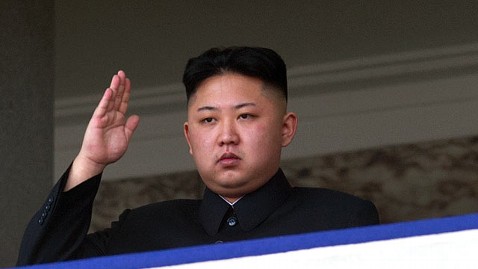N. Korea's Kim More Intent on Nukes Than Dad Was: Analysis

North Korean leader Kim Jong-Un saluting as he watches a military parade to mark 100 years since the birth of the country's founder and his grandfather, Kim Il-Sung, in Pyongyang, April 15, 2012. (AFP/Getty )
When Kim Jong Un took power in North Korea after the death of his father Kim Jong Il in 2011, hopes were high among North Korea watchers that the Swiss educated leader would be different and more reasonable when it came to the country's ambitions for a nuclear arsenal.
But after North Korea's third nuclear test earlier today, it is clear that that expectation ended up exactly the opposite. Kim Jong Un is pushing North Korea's ambitions even harder, faster, and more decisively than his late-father and his late-grandfather Kim Il Sung.
North Koreans, experts believe, are insecure. They have for decades believed that the outside world's agenda is to topple the Kim family regime and that offers of aid in return for compliance are "empty promises" meant only to make them stop from developing nuclear weapons.
"The message is clear. We are a genuine nuclear state and nobody can touch. So don't mess with us," said Junghoon Lee, professor of international relations at Yonsei University in Seoul, in analyzing the North's insistence on carrying out nuclear tests.
The world may not like it, but once Pyongyang holds the ultimate means of mass destruction, North Korea's leaders believes that they could secure safety from foreign invasion and demand a larger scale compensation for promising not to push that nuclear button.
All this is possible because North Koreans on the people level are used to the concept of personal sacrifice for the stability of its regime. They are taught to believe that it is a righteous virtue to starve a little to build a stronger nation against "imperialist Americans" and that once they have long-range missiles and a nuclear warhead to top it, "the Yankees will be scared away," as the regime likes to say.
The country was even willing to defy its closest ally China in its pursuit of nuclear weapons. The last remaining hope by the international community to keep North Korea's belligerent actions intact was China. Beijing donates 300,000 to 400,000 tons of food every year, half of what Pyongyang lacks to feed all their people.
Half of 1 million tons of oil that North Korea consumes also come as a donation from China. The last time Beijing was angered when Pyongyang admitted having a highly enriched program in 2003, the pipeline was closed for three days as punishment.
But when Beijing summoned the North Korean ambassador twice and another high level envoy late last month, there was yelling back and forth behind doors which is rare given the long friendly historic ties between the two nations, according to South Korean media reports. North Korea will not budge even to the Chinese pressure.
The precise scope, scale, and type of the nuclear bomb tested is yet to be determined but what is clear is that North Korea does not intend to give up its nuclear program. It will continue with more tests and missile test launches "until they are fully satisfied to say that 'Yes, now we have it, and now it's deployable,'" said Lee.